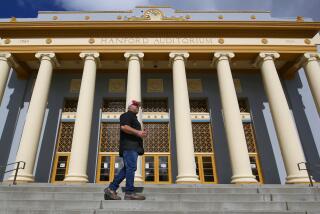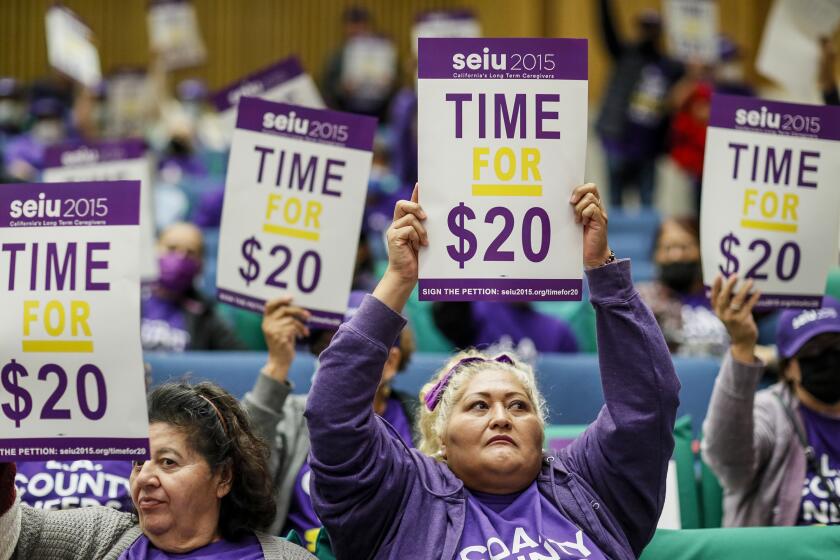Committee Proposes 17 Ways to Speed Up Supreme Court Pace
A blue-ribbon committee, citing the increasing backlog and decreasing productivity of the state Supreme Court, on Tuesday recommended wide-ranging changes in court procedures--including a new unit of staff attorneys to help the justices review death penalty cases.
The 10-member committee, appointed last summer by Chief Justice Malcolm M. Lucas, steered away from proposing radical reforms. The group focused instead on a number of internal measures it said could speed up the court’s work.
Individual Justices Not Studied
Committee members said they made no attempt to study individual justices or single out a particular period in court history. But the group’s 30-page report noted that over the years cases have often been delayed while one justice worked on several dissents; that some justices contributed to delay by overemphasizing “non-substantive, stylistic” aspects of opinions; and that the method of circulating tentative opinions often meant that “cases move at the pace of the slowest justice.”
The Select Committee on Internal Procedures of the Supreme Court, a group of prominent judges and lawyers led by retired state Supreme Court Justice Frank K. Richardson, said the number of appeals to the court increased from 19 a week to more than 100 a week in the last 28 years.
From 1966 to 1979 the court issued an average of 176 written opinions a year. But from 1980 through 1986 the number dropped 27% to an average of 129 annually, according to the committee.
Richardson, appearing with the other committee members at a news conference, conceded that the recommendations were “bland and undramatic.” But he said the group had tried to provide “realistic and practical” solutions to the court’s growing problems.
Lucas was on hand to accept the report, remarking that it contained “an impressive list of suggestions” but making no further comment on its merits.
The justices are expected to begin reviewing the proposals next week. Some of the recommendations could be implemented by the court; others would require legislative appropriations or changes in state law.
Among its 17 formal recommendations, the committee urged that most of the preliminary work of reviewing civil appeals be performed by an expanded central research staff, as is the practice in criminal appeals. Civil appeals now are sent directly to the justices and their individual staffs.
Hiring more staff attorneys and the centralized initial review of civil cases should give the justices more time to decide cases and write opinions, the committee said. At present, court members and their own staffs spend about half their time studying appeals to see which should be granted formal review.
The committee itself set no cost estimate for the staff expansion. But in his current budget, Gov. George Deukmejian has proposed spending $1.28 million to expand court staff.
The group also proposed that a special pool of experienced attorneys be created to review and analyze the death penalty cases that come to the justices on automatic appeal from trial courts.
Death Penalty Cases
Of the 405 cases awaiting decision by the court, 199 involve the death penalty.
In recent years, several proposals have been made to ease the justices’ burden in such cases--such as adopting a constitutional amendment allowing death penalty judgments to be reviewed first in the state Courts of Appeal or by a special appellate panel and then, where a judgment is upheld, by the state Supreme Court.
Richardson said the committee had decided to urge the adoption of less sweeping measures first to see what they might accomplish before a more radical change is considered.
Committee members stressed that the greater use of staff to help refine and clarify issues in the hundreds of cases that come to the court--particularly the voluminous and complex capital appeals--would not lessen the individual responsibilities of the justices.
“I don’t see there is any foundation for real fear that staff attorneys will take over the judging function,” said Judge Shirley M. Hufstedler, a retired federal appellate judge from Los Angeles.
Elsewhere, the committee said it had found that dissents had been a “particular cause of delay,” especially when there are several cases pending in which a single justice plans to file a dissenting opinion.
Time Limits Suggested
The group urged that the court adopt specific time limits in which dissenting opinions could be prepared and that if the deadline is missed, the court majority should go ahead and file its decision, taking note of the dissent without a dissenting opinion or filing such an opinion later.
In other recommendations, the committee proposed that:
- State Bar disciplinary cases and appeals from state Public Utilities Commission decisions should go first to the state Courts of Appeal and then be reviewed by the justices at their discretion.
At present such cases go directly to the state high court.
- The court change the way it handles trial transcripts and other court records while opinions are being drafted. At present, court records are sent in a box from one justice to another, and ordinarily a justice will wait until he has the records before he decides whether to join in a circulating opinion. “Thus, unfortunately, cases move at the pace of the slowest justice,” the committee said.
The group suggested that such records be kept in a central location, available to all justices and staffs, and copies of proposed opinions be circulated simultaneously for prompt concurrence or dissent.
In addition to Richardson and Hufstedler, the committee includes Judges Joseph T. Sneed and Dorothy W. Nelson of the U.S. 9th Circuit Court of Appeals; state Court of Appeal Justices Robert Feinerman of Los Angeles and Harry Low of San Francisco; legal author and attorney Bernard E. Witkin, and Donald Barrett, former principal research attorney at the state Supreme Court. Two court members--Justices Stanley Mosk and Edward A. Panelli--served as advisory members to the committee.
More to Read
Get the L.A. Times Politics newsletter
Deeply reported insights into legislation, politics and policy from Sacramento, Washington and beyond. In your inbox three times per week.
You may occasionally receive promotional content from the Los Angeles Times.






